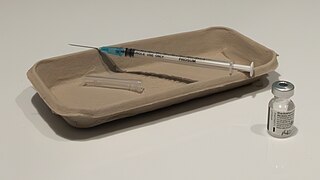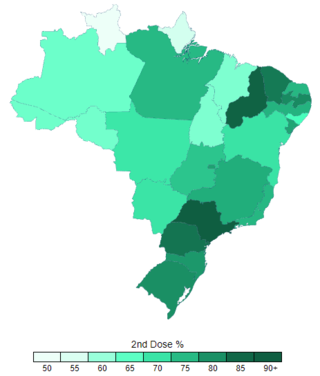The Therapeutic Goods Administration (TGA) is the medicine and therapeutic regulatory agency of the Australian Government. As part of the Department of Health and Aged Care, the TGA regulates the quality, supply and advertising of medicines, pathology devices, medical devices, blood products and most other therapeutics. Any items that claim to have a therapeutic effect, are involved in the administration of medication, or are otherwise covered by the Therapeutic Goods Act 1989, the Therapeutic Goods Regulations 1990, or a ministerial order, must be approved by the TGA and registered in the Australian Register of Therapeutic Goods.
The Joint Committee on Vaccination and Immunisation (JCVI) is an independent expert advisory committee that advises United Kingdom health departments on immunisation, making recommendations concerning vaccination schedules and vaccine safety. It has a statutory role in England and Wales, and health departments in Scotland and Northern Ireland may choose to accept its advice.

The Oxford–AstraZeneca COVID‑19 vaccine, sold under the brand names Covishield and Vaxzevria among others, is a viral vector vaccine for the prevention of COVID-19. It was developed in the United Kingdom by Oxford University and British-Swedish company AstraZeneca, using as a vector the modified chimpanzee adenovirus ChAdOx1. The vaccine is given by intramuscular injection. Studies carried out in 2020 showed that the efficacy of the vaccine is 76.0% at preventing symptomatic COVID-19 beginning at 22 days following the first dose and 81.3% after the second dose. A study in Scotland found that, for symptomatic COVID-19 infection after the second dose, the vaccine is 81% effective against the Alpha variant and 61% against the Delta variant.

The COVID-19 vaccination programme in the United Kingdom is an ongoing mass immunisation campaign for coronavirus disease 2019 (COVID-19) during the COVID-19 pandemic in the United Kingdom.
The COVID-19 vaccination program in the Philippines was a mass immunization campaign against severe acute respiratory syndrome coronavirus 2 (SARS-CoV-2), the virus that causes coronavirus disease 2019 (COVID-19), in response to the pandemic in the country. The vaccination program was initiated by the Duterte administration on March 1, 2021, a day after the arrival of the country's first vaccine doses which were donated by the Chinese government.

The general COVID-19 vaccination in Australia program began on 22 February 2021 in response to the COVID-19 pandemic, with the goal of vaccinating all willing people in Australia before 2022. Front-line workers and aged care staff and residents had priority for being inoculated, before a gradual phased release to less-vulnerable and lower-risk population groups throughout 2021. The Therapeutic Goods Administration (TGA) approved four vaccines for Australian use in 2021: the Pfizer–BioNTech vaccine on 25 January, the Oxford–AstraZeneca vaccine on 16 February, Janssen vaccine on 25 June and the Moderna vaccine on 9 August. Although approved for use, the Janssen vaccine was not included in the Australian vaccination program as of June 2021.

COVID-19 vaccination in France started on 27 December 2020 after the approval of Pfizer–BioNTech COVID-19 vaccine by the European Union commission.
COVID-19 vaccination in Romania started on 27 December 2020. It was announced that the process would be divided into three phases. Medical personnel would be vaccinated first, followed by the population at risk, and finally by the rest of the population. Vaccination was declared free and non-mandatory. As of March 2022, five types of vaccines were authorized to be used in Romania. This is the largest vaccination campaign in the modern history of Romania.

The COVID-19 vaccination programme in the Republic of Ireland is an ongoing mass immunisation campaign that began on 29 December 2020 in response to the COVID-19 pandemic in the Republic of Ireland. Ireland's vaccination rollout has been praised as one of the most successful rollouts in the world and was ranked number one in the European Union in terms of its percentage of adult population fully vaccinated, and was also ranked number one in the EU for the number of booster vaccines administered.

COVID-19 vaccination in Canada is an ongoing, intergovernmental effort coordinated between the bodies responsible in the Government of Canada to acquire and distribute vaccines to individual provincial and territorial governments who in turn administer authorized COVID-19 vaccines during the COVID-19 pandemic in Canada. Provinces have worked with local municipal governments, hospital systems, family doctors and independently owned pharmacies to aid in part, or in full with vaccination rollout. The vaccination effort in full is the largest such immunization effort in the nation's history. The vaccination effort began December 14, 2020, and is currently ongoing.
The COVID-19 vaccination program in Colombia is an ongoing effort of mass immunization put in place by the Colombian government in order to respond to the ongoing COVID-19 pandemic. The virus causing COVID-19 was confirmed to have reached Colombia on 6 March 2020. Colombia's preparation and readiness for a vaccine program allowed it to join the first group of countries who received vaccines through COVAX. The first vaccine in Colombia was given to a nurse on 17 February 2021.

Post-vaccination embolic and thrombotic events, termed vaccine-induced immune thrombotic thrombocytopenia (VITT), vaccine-induced prothrombotic immune thrombocytopenia (VIPIT), thrombosis with thrombocytopenia syndrome (TTS), vaccine-induced immune thrombocytopenia and thrombosis (VITT), or vaccine-associated thrombotic thrombocytopenia (VATT), are rare types of blood clotting syndromes that were initially observed in a number of people who had previously received the Oxford–AstraZeneca COVID‑19 vaccine (AZD1222) during the COVID‑19 pandemic. It was subsequently also described in the Janssen COVID‑19 vaccine, leading to the suspension of its use until its safety had been reassessed. On 5 May 2022 the FDA posted a bulletin limiting the use of the Janssen Vaccine to very specific cases due to further reassessment of the risks of TTS, although the FDA also stated in the same bulletin that the benefits of the vaccine outweigh the risks.
The Australian Technical Advisory Group on Immunisation (ATAGI) is a technical advisory group of the Australian Government. As part of the Department of Health, ATAGI provides advice to the Minister of Health on the immunisation program of Australia and related matters, including the strength of evidence pertaining to existing, new, and emerging vaccines.
The COVID-19 vaccination campaign in Quebec was a provincial effort to distribute and administer vaccines against COVID-19.

The COVID-19 vaccination campaign in Germany began on 26 December 2020.

The COVID-19 vaccination campaign in Brazil is an ongoing mass immunization campaign for the COVID-19 pandemic in Brazil. It started on January 17, 2021, when the country had 210 thousand deaths.
COVID-19 vaccination in Iceland is an effort to immunize the adult population of Iceland due to the COVID-19 pandemic. As of July 2021, more than 260,000 individuals had received at least one dose of COVID-19 vaccine, which was over 78% of the country's population. On November 21, 2021, 90% of the target population had been fully vaccinated, while around 1 in 5 people had received a booster on top of that; by December 9, 2021, the share of the population having received a booster shot exceeded 50%. On December 13, 2021, the country began offering Pfizer vaccinations to children aged 5–11.

COVID-19 vaccination in Taiwan is an ongoing immunization campaign against severe acute respiratory syndrome coronavirus 2 (SARS-CoV-2), in response to the ongoing pandemic in the country.
The COVID-19 vaccination campaign began in Fiji on the first quarter of 2021 and will continue throughout the year with the goal of vaccinating all eligible Fijians. The government has made it mandatory for all eligible adults to take the COVID-19 vaccines.
COVID-19 vaccination in Ontario began in December 2020, when the first doses of the Pfizer-BioNTech COVID-19 vaccine were administered. In February 2021, shipments for both the Pfizer and Moderna vaccines increased significantly. By May 2021, over 50 percent of Ontarians had received their first dose. By the beginning of 2022, over 80 percent of Ontarians had received their first dose.










